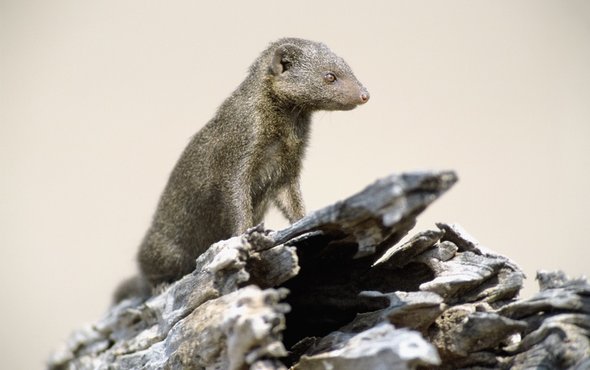(单词翻译:单击)
听力文本
This is Scientific American — 60-Second Science. I'm Jason G. Goldman.
Got a minute?
Small, tasty mammals like dwarf mongooses have one main goal: do not get eaten. So the animal—a type of weasel—has a surveillance system. While most of the group focuses on finding food, a handful of others watch for predators. They take turns so that the burden is distributed equally. But in other ways, there's a definite class distinction.
"You have a typical cooperative breeding society, which you see in a number of different species, like meerkats for example or African wild dogs. So you have a dominant breeding pair, male and female pair that will reproduce, and they're the only group members that are guaranteed to have offspring."
University of Bristol biologist Julie Kern.
"But then within both sexes there's a linear dominance hierarchy, so if you are quite far down the hierarchy in your own group, it could take quite a long time for you to reach that breeding position, which is what you really want. So it may be best for you to actually leave your group that you were born into and try to join another group where there are fewer same-sex individuals, so you can effectively join a group higher up the queue than the one that you're already in."

When new immigrants shows up, that means more mongooses can act as lookout against predators. Right? In reality, it's more complicated.
Kern and her team observed seven different groups of wild dwarf mongooses in South Africa. They found that new immigrants rarely served as sentinels. It wasn't until they'd been in their new groups for five months, on average, that they spent as much time working as lookout as the other mongooses did. The study was published in the journal Current Biology.
Kern thinks that mongooses go through a transition phase before they're fully integrated into the new group. In part, that's because newcomers arrive exhausted and underweight. They need time to recover before becoming fully contributing members of mongoose society.
But the existing group also takes a while before they trust newcomers. In a playback study, the researchers found that mongooses responded far less to the sentinel calls (surveillance call sound) of recent immigrants than to those from others they already knew and trusted. But after a few months spent getting to know their new friends, they began to trust them, and reacted appropriately when hearing the alarm call.
(alarm call sound)
"When individuals first join, they don't contribute much to sentinel behavior, and when they do, that information is generally ignored. But within five, six months down the line, then those individuals contribute just as much as everyone else does, and residents value their information just as much as everybody else does."
Ultimately, increased group size really is beneficial to all members of a group—new immigrants just need a chance to get settled.
Thanks for the minute for Scientific American — 60-Second Science. I'm Jason G. Goldman.
参考译文
这里是科学美国人——60秒科学。我是杰森·高德曼。
有一分钟时间吗?
像矮猫鼬这种体型又小又美味的哺乳动物有一个主要目标:不要被吃掉。所以矮猫鼬有一套监视系统,这种动物是鼬鼠的一种。在族群中的大多数成员去寻找食物的时候,其他一小部分成员负责留意捕食者。它们会轮流换岗,使重担可以平均分配。但在其他方面,又存在明确的等级差别。
“你会看到一个典型的合作型繁殖社会,和其他许多物种一样,比如狐獴或非洲野狗。有一对优势种进行配对,雄性和雌性繁殖后代,族群中只有这两只猫鼬有权繁殖。”
布里斯托大学的生物学家朱莉·科恩说。
“但是在两性中都有一种线性的统治等级制度,所以,如果在自己的群体中等级很低,那需要相当长的时间才能达到负责繁殖的位置,而这个位置是你真正想要的。因此你最好离开你出生的这一群体,尝试加入另一个同性较少的群体,这样你在新队伍中的等级就能比在以前群体的高。”
当新加入的猫鼬出现时,就意味着有更多的猫鼬可以充当警戒捕食者的监视员,对吧?而事实要复杂得多。
科恩和团队在南非观察了七组不同的野生矮猫鼬群。他们发现,新加入的猫鼬很少担任哨兵。平均来说,它们在加入新群体五个月以后,才能和其他猫鼬一样担任哨兵的工作。这项研究结果发表在《当代生物学》期刊上。
科恩认为,猫鼬在完全融入新群体之前会经历一个过渡阶段。部分原因是新来者在刚加入时处于疲惫状态,而且体重很轻。它们需要时间恢复,然后才能成为猫鼬族群中有充分贡献的成员。
但是,现有群体也需要一段时间才能信任新人。在回放研究中,研究人员发现,与其它已经了解且信任的成员相比,猫鼬对新人哨兵呼叫(监视呼叫声音)的反应要少得多。但在与新朋友认识几个月以后,它们开始信任新人,并在听到警报呼叫时做出适当反应。
(警报呼叫的声音)
“当一只猫鼬首次加入一个群体时,它们对哨兵行为的贡献并不大,当它们负责放哨时,它们传达的信息通常会被忽略。但是在五六个月之后,新加入猫鼬的贡献就和其它猫鼬一样多了,而且新加入者发出的信息也会像就像其它猫鼬的一样得到重视。”
最后,群体规模的扩大对群体中每名成员都有益处,新加入的猫鼬只需要一个适应的机会。
谢谢大家收听科学美国人——60秒科学。我是杰森·高德曼。
译文为可可英语翻译,未经授权请勿转载!
重点讲解
重点讲解:
1. watch for 密切注意;戒备;提防;
例句:We'll be watching for any developments.
我们会密切注意事情的任何进展。
2. take turns 轮流;依次;
例句:He and Carla Torgerson take turns as the band's lead vocalist.
他和卡拉·托格森轮流担当乐队的主唱。
3. in reality 事实上;实际上;
例句:But in reality, everyone struggles in life.
但是现实生活中,每个人都在生活中挣扎着。
4. integrate into (使)加入;(使)融入;
例句:He didn't integrate successfully into the Italian way of life.
他没有顺利地融入到意大利的生活方式中。


